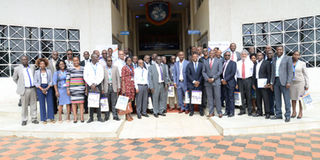How Mount Kenya University is building academic relevance

Representatives from Mount Kenya University led by Vice Chancellor Stanley Waudo, Vice Chairman University Council Vincent Gaitho and Dr. Peter Kirira, Director MKU foundation pose for a group photo with representatives from industries in Thika after holding an Industry-University breakfast forum. PHOTO | COURTESY
What you need to know:
- On February 21, the university hosted 20 Thika-based firms at its main campus in Thika, initiating a fresh, sustained dialogue between the partners.
- Prof Waudo added that cooperation among higher education stakeholders was necessary for universities to achieve several goals.
Mount Kenya University (MKU) has amplified its conversation with industry by creating a platform to strengthen mutual ties.
On February 21, the university hosted 20 Thika-based firms at its main campus in Thika, initiating a fresh, sustained dialogue between the partners.
The firms attended the meeting as members of the Central Region chapter of the Kenya Association of Manufacturers (KAM).
“As universities implement their missions, satisfying job market requirements is emerging as a major challenge. This is particularly so when knowledge and skills are transferred in a classroom without external stakeholders’ participation,” observed MKU Vice-Chancellor Prof Stanley Waudo.
He pointed out that stakeholder participation can influence the relevance of the generated and transferred knowledge and skills.
SEVERAL GOALS
Prof Waudo added that cooperation among higher education stakeholders was necessary for universities to achieve several goals. They would be able to generate new knowledge through research.
They would also be able to transfer knowledge and impart useable skills through teaching with the aim of producing competent and skilled workers. They would be better placed to provide innovative service to the society. Universities would also be enabled to manage knowledge.

Dr. Bibianne Waiganjo-Aidi, DVC ARA (centre) shares a light moment with Bimal Shah, MD Broadway Bakery Ltd (left) and Jane Irungu, Bakex Millers after the conclusion of the Industry-University Partnership Breakfast Meeting at Mount Kenya University. PHOTO | COURTESY
This was the first of a series of initiatives meant to forge strong partnerships with industry, bearing in mind the President’s Big 4 Agenda, to enable the university and industry to realise their respective missions.
During the meeting, representatives from industry suggested areas of possible partnership that will enhance practical-oriented training that qualifies students for the labour market and for individual transformation as envisaged in MKU’s Mission.
GAME-CHANGER
MKU Foundation Director Dr Peter Kirira describes the meeting as a game-changer that promises massive benefits to students, the university, industry and communities.
He says: “It demystifies the notion that industry cannot engage directly with the academia. Obviously, we operate in the same environment and so, share a common understanding of the context and needs of our clients and the community.”
Dr Kirira adds that both parties are keen on this journey.
“In the next few weeks, we will appoint a joint working group with members drawn from the university and industry to spearhead activities to be agreed upon by the two partners.”
What does this mean to students?
“They will benefit through industrial attachments, job placement, mentorship and relevant curricula developed jointly with industry,” Dr Kirira explains.
ENDOWMENT FUND
He adds that the partners plan to create an endowment fund to support scholarships and joint activities. What does this mean to industry?
The MKU don explains that industry will benefit through research based solutions that address industry problems, short courses offered to industry staff as well as improved products and services uptake. The two partners would undertake joint corporate social responsibility activities using MKU campuses. Jointly developed curricula will produce a skilled workforce for industry.
Additionally, industry will participate in two projects on university-industry cooperation for the implementation of the knowledge triangle and entrepreneurship-oriented training approach.
The European Commission is funding a programme titled African Higher Education Leadership in Advancing Innovation for Development (AHEAD). The German Academic Exchange Service or DAAD is funding the Collaboration of Entrepreneurial Universities (CEPU) programme.
REVIEW
The meeting resolved to form a technical working group that will spearhead the proposed areas of partnership and linkages that will include curriculum review, more extensive internship opportunities, and people-centred research collaboration.
The taskforce will also establish a possible direct link with industry players, the county government, employer bodies, policy makers and regulators for the benefit of the partnering institutions.
Dr Kirira reveals that MKU plans to roll out this engagement to other towns, especially where it has campuses.
MKU was represented at the meeting by Dr Vincent Gaitho, Vice-Chairman of the University Council; Prof Waudo, the VC; Dr Bibianne Waiganjo-Aidi, DVC Academic & Research Affairs and Dr Evans Mwiti, DVC Administration, Planning & Institutional Advancement.
Enterprises represented at the MKU-industry meeting
1. BIDCO
2. Kenya Nut Company
3. Octane Logistics
4. CentroFood Industries Ltd.
5. Blue Nile Rolling Mills Ltd.
6. Broadway bakery
7. Bakex Millers
8. Kel Chemicals
9. Chania Feeds ltd.
10. Capwell Industries Ltd.
11. Kenya Vehicle Manufacturers Ltd.
12. Dune Packaging Ltd.
13. Medisel (K) Ltd.
14. Green Pencils Ltd.
15. Neo Kenya Mpya Ltd.
16. Family bank
17. Stanbic Bank
18. GT Bank
19. Equity Bank
20. The Luke Hotel Cravers.


